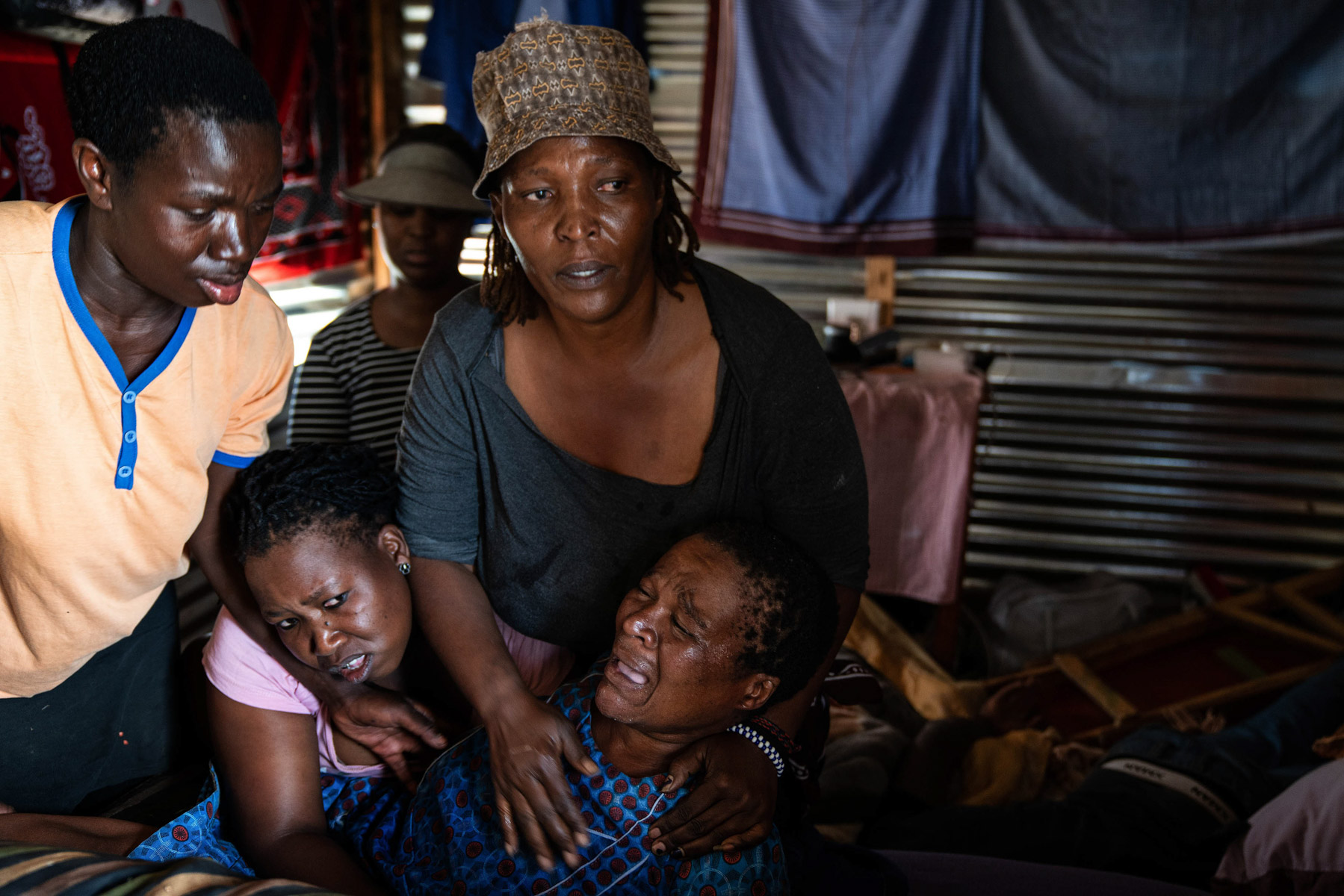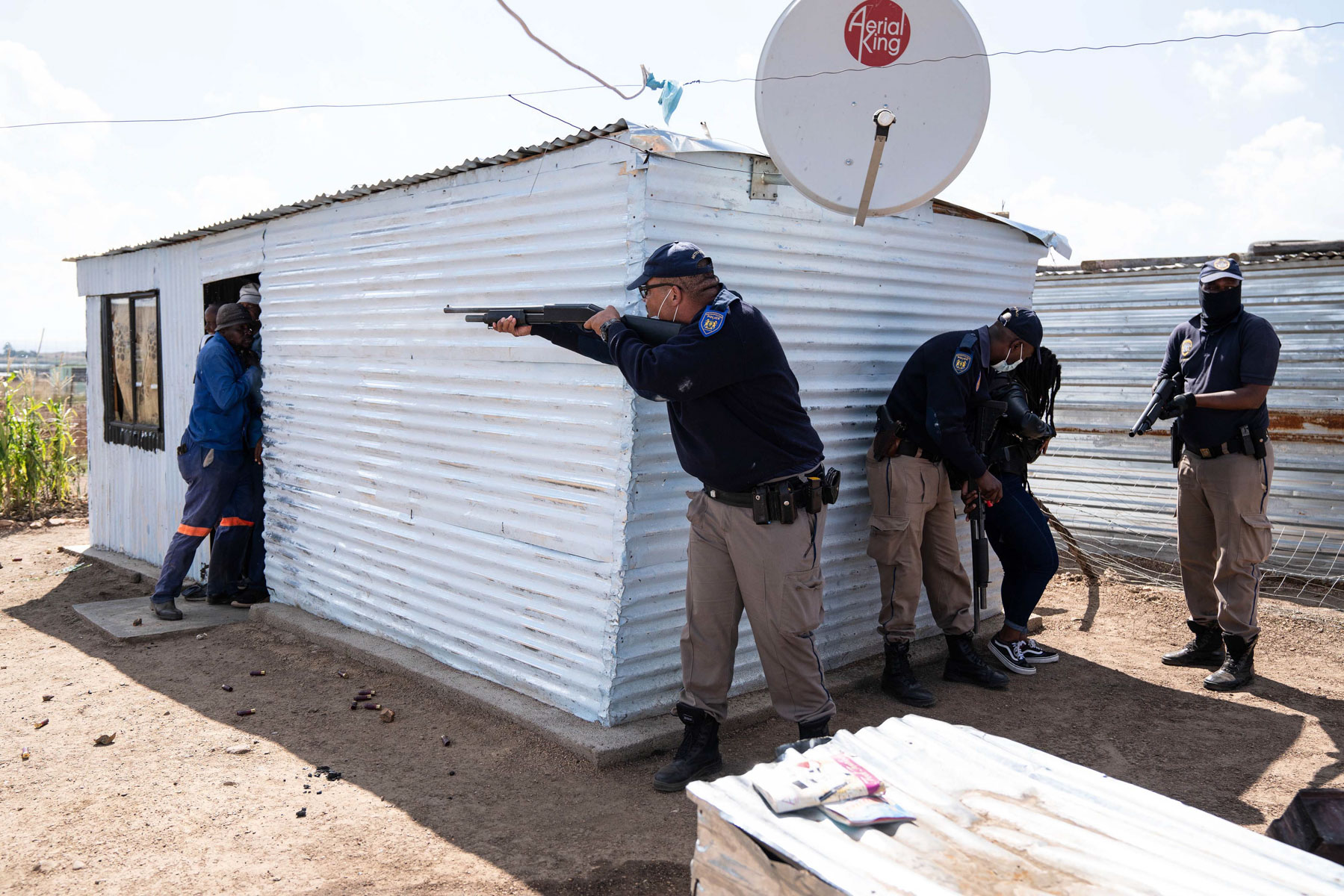City of Joburg’s heartless Red Ants demolitions
Despite a moratorium on evictions during the Covid-19 lockdown, shack demolition continues in Gauteng and residents who try to salvage their meagre belongings are met with harsh state force.
Author:
22 April 2020

The City of Johannesburg and the Red Ants continued with their brutal evictions of people and the demolition of so-called empty stands in the Lakeview shack settlement south of Johannesburg on Tuesday 21 April.
The City had started with evictions in Lakeview, which borders Lawley to the west and Ennerdale to the south, a week earlier. On Tuesday, as about 1 000 employees of the Red Ant Security Relocation & Eviction Services accompanied Johannesburg Metro Police Department (JMPD) officers and City officials, residents tried to fight back against the demolitions.
While this violence played out, the Johannesburg high court ruled that the demolitions may continue.
Residents became increasingly angry and hostile as the Red Ants demolished their shacks and carried the sheets of corrugated iron to their trucks. The operation was brought to a halt as angry and desperate residents tried to protect what little they had and edged nearer, within stone-throwing distance.
This triggered a number of skirmishes between Red Ant and JMPD members, and Lakeview residents. Just in time, two JMPD officers reached a man who had been pulled out of his shack by Red Ants armed with crowbars and sticks. One Red Ant hit the man over the head with a piece of wood before the JMPD officers pulled him away from the Red Ants.
Metro Police officers moved deeper into Lakeview, trying to push the angry crowd away from the Red Ants. As one JMPD officer led a small group of officers, they encountered Stanley Zaki, 58, outside a shack. Although he had a piece of corrugated iron in his hands, Zaki did not pose a threat. But one of the officers shot at Zaki from close range, hitting him in the neck with a rubber bullet. Zaki clutched at his neck as blood trickled down between his fingers.
Looking dazed and with the rubber bullet lodged in his neck, Zaki stood by and watched as the JMPD officers shot at a group of people hiding in the dark and cramped shack in front of where he had just been shot. “I did not do anything. They just shot me,” Zaki groaned.

In hiding
One JMPD officer forced the door open and shot at the people hiding in the crowded shack. Another officer tried to rip away a sheet of corrugated iron at the back. Lindiwe Ndlovu, one of the women inside, said the officer had ripped open the back of the shack to shoot at them from the other side.
While the officers were trying to force people to come out, in defence of their homes residents started pelting rocks at them from different angles. For a moment it looked like the JMPD officers might have to run away. It was only when one of their riot control vehicles approached that the stone-throwers dispersed.

This gave the officers the chance to detain the people who had been hiding in the shack. One officer slapped two women and pulled them by the collars of their shirts towards the riot control vehicle, to arrest them. They also led Zaki, who at this point had blood all over his shirt, to the vehicle. He was looking weak, pale and sweaty.
While one of the JMPD officers was arresting some of those who had hidden in the shack, Victoria Maphalale, an elderly woman, appeared to be having a seizure inside. Another woman there was crying out: “Help us, help, she’s dying.”

Ndlovu shouted at the JMPD officers to help, but they ignored her. As Ndlovu and a New Frame photographer carried Maphalale outside towards the truck, pleading with the JMPD officers to help, they held up their hand before driving away.
“They just came and attacked us while we were inside. The gogo collapsed and we asked for help,” Ndlovu said, after fetching a pillow from inside the shack to put under Maphalale’s head.
“We asked them for help and they just said she must die. They just left her like this. How can they do this to people?” an exasperated Ndlovu asked as angry community members started surrounding Maphalale and the two women who were tending to her.
‘Violating regulations’
Proportional representation councillor Oupa Sako eventually drove Maphalale to a clinic to get medical attention. He condemned the violence with which the demolition and eviction was carried out, and questioned what “essential service” the Red Ants were providing.
“In my personal view, this is uncalled for, especially looking at the situation we are in right now with all these regulations and Covid-19 happening,” he said. “The City of Johannesburg just decided to try and violate all those regulations.”

“Their tactic is to go and provoke people, and when they make sure people come out on the streets, then they arrest them for violating Covid-19 regulations. You can’t go and provoke people. Automatically they will be outside when you do that. You can’t arrest them,” he said.
Many of the residents complained that some of their possessions, including cellphones and money, were gone after the Red Ants moved through the area.
Sako said the Lakeview shack settlement was established about three years ago. Some of the areas where the demolitions were being carried out had been built up from January. “I drove around there and I didn’t see any land invasions,” he said.

‘No court orders’
Earlier in the morning, Chinah Mashiya, 60, and her husband were standing outside their shack watching as the Red Ants tore down neighbouring shacks.
“We don’t know what’s happening. We have been staying here for two years, but they are saying we are just arriving. Does my house look like I just built it,” Mashiya asked, pointing to her house made from corrugated iron. Leading to the door was a brick pathway, with the dirt either side of it raked neatly.
“The people whose shacks are being destroyed are at work. This is very much unfair. I was at the clinic this morning and my husband was at work when they called us and said come. If we didn’t get here in time, they would have destroyed our house. I am sure. Look at my door,” she said. The door was damaged around the lock, as if someone had tried to force the door open.
“They talk about court orders, but we haven’t seen any court order. They just come here and shoot at us. They didn’t tell us to vacate, they just came here like this.”

While this was happening, Gauteng member of the executive council for human settlements Lebogang Maile said the province had taken a principled stance to not tolerate any opportunistic illegality despite a moratorium on evictions on private and government land.
Maile conceded that there may have been people who genuinely lived there and were affected by the evictions. He said the Department of Social Development would allocate housing if the residents met certain criteria, but didn’t expand on these criteria.
Maile introduced measures that include a blanket court order to interdict and restrict the occupation of and building on government-owned land, municipalities being given power of attorney to assist in the monitoring of land occupations, teams at incomplete building projects, and the sharing of expertise between municipalities and the counter-land invasion unit.
‘Inhumane’ violence
Despite people clearly living in some of these shacks, City of Johannesburg mayor Geoff Makhubo insisted that the structures that had been demolished were new, incomplete and unoccupied.
“As a City, we do not celebrate these routine court victories. Our preoccupation is the prevention of land invasions for the sole purpose of implementing planned development within the City for the benefit of the poor and the growth of the City,” he said.
Social Justice Coalition general secretary Axolile Notywala said the violence meted out against defenceless residents was an indication of who the government cared for. “It is concerning that violence is handed down in such an inhumane manner during this time. We started seeing these in Durban, then in Cape Town and now in Johannesburg … The response has been to render people homeless … A lot of people occupying land are not occupying because they want to, they have to pay rent they do not have,” he said.

Notywala said the focus should be on those not complying with the moratorium on evictions, and money should be redirected to beneficial developments. “Think of the money to hire these private companies. That is money that could be used to provide food and water to people rendered homeless. They [the Red Ants] are a private company with operations across the country.”
Notywala said the distinction employed between eviction and demolition is intentional. In some instances, furniture had been found inside the houses.
He added that the City of Johannesburg was following the City of Cape Town’s use of specific language to bypass regulations set out by the Prevention of Illegal Eviction from and Unlawful Occupation of Land Act.
The City has agreed to halt demolitions following an intervention by the South African Human Rights Commission (SAHRC), who will be meeting with the City on Thursday over the demolitions.

